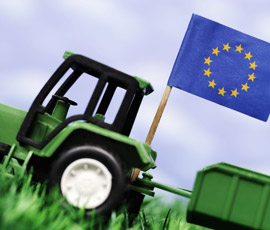NFU conference 2013: CAP vital for survival says COPA president

A strong Common Agricultural Policy is vital to tackle food security and climate change, according to the president of the European farmers’ association.
Farmers throughout the world will face huge challenges in coming years, said COPA president Gerd Sonnleitner, as pressure on resources of land and water increase.
The CAP is vital to allow farmers in Europe to compete with nations like the US, Brazil, and China, which have many much larger farms than the UK.
“Without the CAP we would have seen a huge structural revolution in farming,” said Mr Sonnleitner, speaking at the NFU Conference.
“Farms in the more difficult areas would have disappeared altogether. Those that survived would have to compete with the huge farms which we see in our competitor countries.”
Food security could no longer be taken for granted, he said, even in Europe. Alongside competition for resources, farmers are starting to feel the first effects of climate change.
“To weaken the CAP now would be like jumping ship, just when a storm was brewing. We need a strong CAP more than ever before.”
The economic position of farmers is the most important concern, said Mr Sonnleitner, as without a reasonable income, farmers cannot provide services and cannot modernise.
“This is why the maintenance of direct payments is so important and why farmers are totally opposed to any transfer of funds from the first to the second pillar,” he said.
Strengthening farmers’ position in the food chain was necessary to reduce dependence on direct payments, he said. While the appointment of a supermarket adjudicator in the UK was an important step, similar action at a European level should be next.
Secondly, the Commission should ensure that greening economically benefits farmers, he said. “Greening is fine providing that it also contributes to growth. But the Commission’s own impact studies show that their proposals will simply lead to higher farm costs and reduced production.”
Another “major worry” for the union was the simplification of CAP, which may not allow for flexibility. “We need flexibility to take account of the diversity of European farming. But we must find ways of achieving this without imposing yet more controls and paperwork on farmers.”
Lastly, Mr Sonnleitner warned delegates about trade distortions. Under the proposals currently under discussion, he said, one Member State could decide to pay their farmers a basic payment equal to around two-thirds of their first pillar funds. In contrast, another could decide to shift 15% of their national envelope to the second pillar and/or redirect much of it to specific causes under the first pillar – to help areas with natural handicaps, young farmers, small farmers, specific types of production.
“This could completely undermine our attempts to reduce the gaps between the different levels of hectare payments. It also risks putting many farmers at a completely unfair competitive disadvantage and undermining the Single Market,” he warned.
For more on this topic
News from the NFU conference 2013
